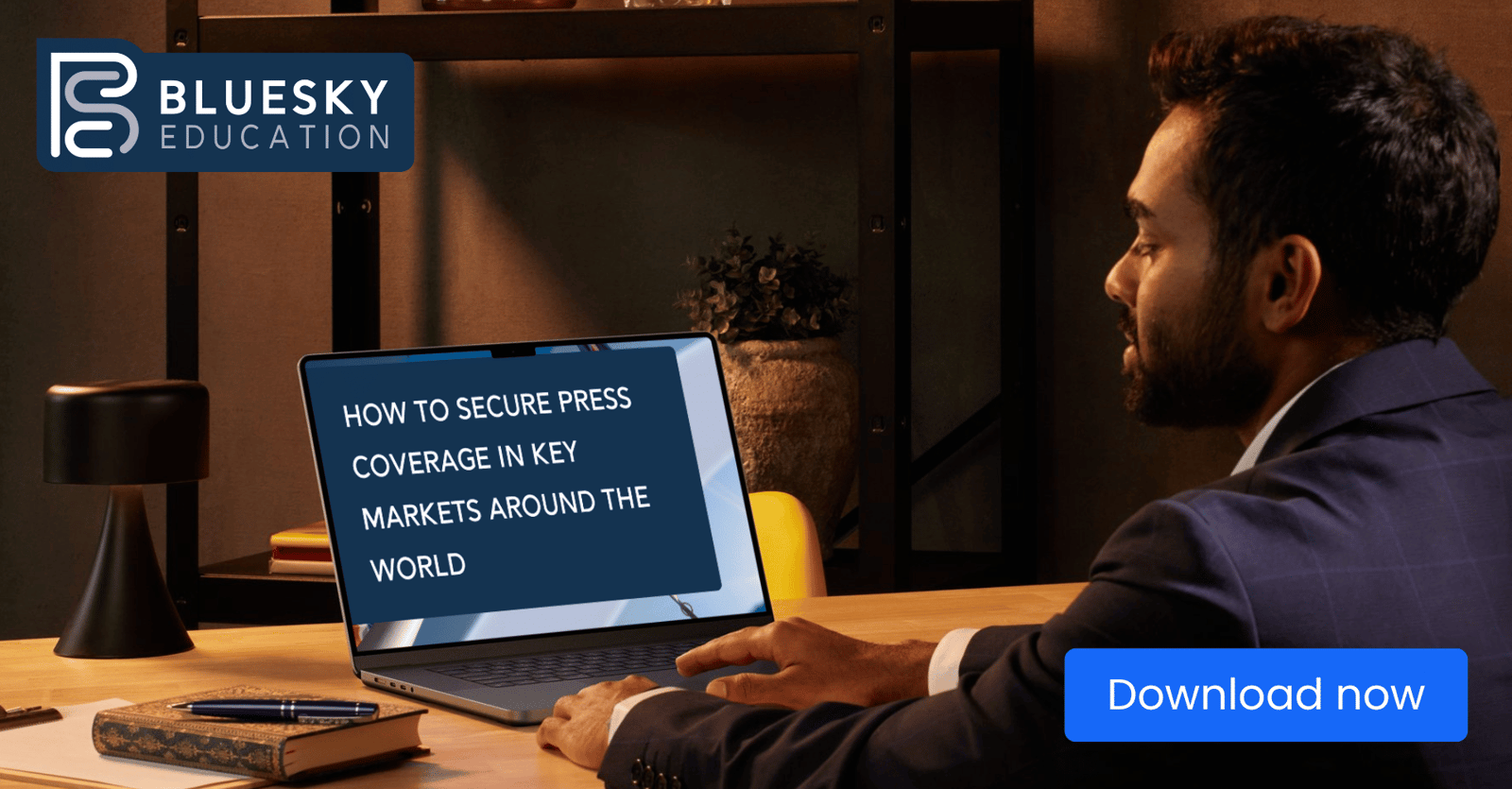Do you find yourself apprehensive about engaging with the media to secure press coverage?
Perhaps you have heard horror stories of people speaking with journalists and writing scathing articles, don’t see the benefit or value of media work, or maybe you do want to engage with the media but think it will be too difficult or don’t know where to start.
Whatever your reason, press coverage is most definitely worth it, and with some useful tips and advice, is nothing to be afraid of. Securing and succeeding with press coverage could be easier than you think.
Unsure of the value of media work?
You may be unsure as to whether doing work with the media is worth it in the first place.
Well, the right article in the right outlet could significantly increase your student uptake from a target country, lead to an invite to speak at the World Economic Forum (WEF), or an offer to present research findings to a United Nations (UN) committee.
These are all real outcomes we have secured for clients thanks to press coverage. A well-written press release in the hands of a UN employee can do wonders, as can a beautifully-crafted article seen by representatives for the WEF, or a series of student stories published in appropriate media outlets of target countries.
Also, did you know, research shows that academics with more media coverage get more research citations? This means the research will be seen and read by more individuals, and have a greater chance of having a real impact in the world.
Nervous about media work?
Now that you’re convinced of the value of press coverage, you might still be nervous about the reality of engaging with media. But you don’t need to be. When engaging with media, there are just a few things to remember.
Over the years, advancements have changed the way in which we interact and communicate which each other. Not too long ago, you may have been expected to meet with a journalists in-person or talk over the phone when being interviewed.
Particularly after the rise of hybrid and remote working, a majority of journalists are conducting interviews over virtual platforms, such as Zoom or Teams, or simply looking for contributors to provide written comment over email.
Compared with phone calls, a video call allows journalists to still speak with interviewees face-to-face, no matter the distance between them. But simply being able to see the face of your interviewer can make it far easier to understand each other and have a fruitful conversation.
Providing comment over email can be beneficial for journalists who are short on time or have short deadlines, or for spokespeople who are perhaps less confident about being interviewed by phone or video call.
However, sometimes an interview over Zoom or Teams is necessary, but absolutely nothing to be afraid of.
If participating in a virtual interview, make sure your camera is situated in a way that gives them a good view of yourself and make sure your background is appropriate. Also, ensure you have a good internet connection. The journalist might not be too impressed if the connection keeps cutting out so they can’t hear what you’re saying.
If you’re nervous or apprehensive about speaking to journalists, don’t forget that they want to speak with you because you’re the expert. They want to find out what you know and what you can say on a certain topic because you’re the authority on that subject. And in a world of misinformation and disinformation, your voice as an academic expert is all the more important.
But most importantly, always remember, nothing is off the record. Anything you say to a journalist can and will be used. Make sure you have an idea of what you want to speak about before the interview so the discussion flows nicely and you don’t say something you shouldn’t. This applies to all interviews, no matter the format.
What do you want to achieve?
To succeed with press coverage, you have to decide what you want your press coverage to achieve. You can’t succeed in something if you don’t know what that success should look like.
Do you want to increase student uptake from a particular country? Do you want to enhance your institution’s reputation? Or do you want to exhibit the calibre of your institution’s research?
There are many end goals for pursuing press coverage, and securing these can be much easier once you ascertain what you want your goals to be.
For example, if you want to increase student uptake, we suggest focusing on producing student diaries or stories detailing the experience of students currently studying at your institution. A number of higher education websites take interest in publishing these such as Study International and Times Higher Education.
The content you share can also be targeted towards specific regions you are interested in increasing uptake from. For example, major Indian publications such as Free Press Journal, Times of India, or Indian Express publish articles detailing the experiences of Indian students abroad.
To demonstrate what students on your courses can actually achieve thanks to their education, you can focus on sharing stories of successful graduates. Perhaps they have founded their own successful company or work at a high-level for a well-known company. Publications such as The Financial Times, AMBITION magazine, and Authority Magazine take interest in stories such as these.
How we can help
At BlueSky Education, we can help with the various stages of securing press coverage and media work to make it that bit easier for you.
If you don’t know who is best to contact with a story or topic, we have fantastic contacts and know exactly which journalists focus on which areas. If you don’t have time to write an article and risk missing an opportunity with a top-tier publication, we can ghost-write the article on your behalf. All we would need is a copy of the research paper, if that’s what the article is about, or a quick conversation with you to discuss the topic of the article and what you want to include.
For more advice on how to succeed with press coverage, and how BlueSky Education can help, get in touch today.
Kyle is experienced in working with leading institutions in far-flung corners of the globe, from London to Kazakhstan. His client list features the likes of the London School of Economics’ Department of Management, ESMT Berlin, BI Norwegian Business School, Nazarbayev University, and many more around the globe.
Originally published December 2021, updated October 2024





